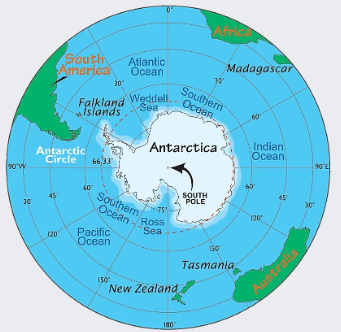India Hosts 46th Antarctic Treaty Consultative Meeting (GS Paper 2, IR)

Context:
- India recently concluded the successful hosting of the 46th Antarctic Treaty Consultative Meeting (ATCM-46) and the 26th Committee on Environmental Protection (CEP-26).
- These crucial gatherings were organized by the Ministry of Earth Sciences in collaboration with the National Centre for Polar and Ocean Research (NCPOR), Goa, and received support from the Antarctic Treaty Secretariat headquartered in Argentina.
Theme and Focus:
- ATCM-46 centered around the theme of "Vasudhaiva Kutumbakam," a Sanskrit phrase embodying the concept of one Earth, one family, one future.
- During the event, participating parties reaffirmed their commitment to the Antarctic Treaty of 1959 and the Protocol on Environmental Protection to the Antarctic Treaty (Madrid Protocol) of 1991.
Key Outcomes:
1. Preservation Efforts: The ATCM and CEP serve as pivotal global forums for collaborative dialogue and action aimed at preserving Antarctica's pristine and fragile ecosystems.
2. Tourism Framework: A working group discussed the development of a tourism framework for Antarctica, addressing the growing interest in exploring the southern continent while ensuring responsible visitation and environmental protection.
3. Management Plans: Parties adopted 17 revised and new management plans for Antarctic Specially Protected Areas (ASPAs), highlighting the commitment to conservation and sustainable management practices.
4. Renewable Energy and Biosecurity: Efforts to increase renewable energy use and implement robust biosecurity measures to mitigate the risks of Highly Pathogenic Avian Influenza were encouraged.
Significance of Antarctic Research:
- Antarctica serves as a crucial laboratory for studying climate change, ozone layer depletion, space exploration analogs, and scientific discovery.
- India's active involvement in Antarctic research underscores its commitment to global environmental stewardship and scientific advancement.
India's Engagement:
- India, a signatory to the Antarctic Treaty since 1983, ratified the Madrid Protocol in 1998 and the Convention on the Conservation of Antarctic Marine Living Resources (CCAMLR) in 1985.
- Additionally, India participates in international bodies such as the Council of Managers of the National Antarctic Programme (COMNAP) and the Scientific Committee on Antarctic Research (SCAR), cementing its prominent role in Antarctic affairs.
About Antarctica:
- Antarctica, the southernmost continent, boasts extreme environmental conditions and unique geological features.
- It is divided into East Antarctica and West Antarctica, characterized by distinct geological compositions and topographies.
- Mount Erebus, located on Ross Island, stands as the southernmost active volcano on Earth.
- Antarctica's significance extends beyond terrestrial boundaries, with its ice sheets playing a critical role in regulating global climate and sea levels.
Conclusion:
- In essence, India's successful hosting of ATCM-46 underscores its commitment to international cooperation, environmental preservation, and scientific research in Antarctica, contributing to global efforts aimed at ensuring the sustainable future of the southernmost continent.


